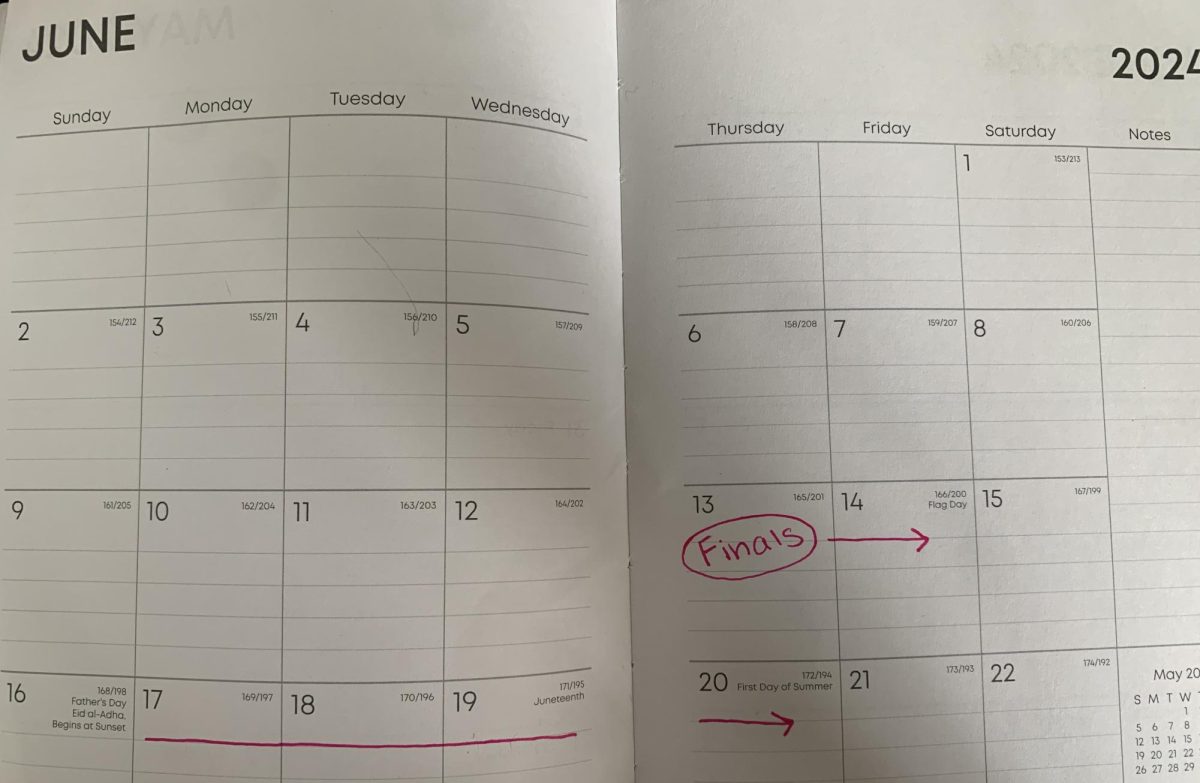Before students embark on a well-deserved summer vacation, they must endure final exams. Final exams put a lot of pressure on students, potentially resulting in increased stress. They are particularly stressful for freshmen, who have only taken midterms before. Rather than letting the stress hold you back, teachers recommend preparing early to ensure you succeed.
The dates for final exams were originally the 11th, 12th, 13th, and 14th of June, but they were moved due to school being canceled for storms. The current dates are June 13th, 14th, 17th, 18th, and 20th. The 20th is a make-up day for students who were absent for any tests or exams.
Midterms took place on half days, and each day was dedicated to two different subjects. This year, finals are full days, and buses are still running at the regular time. Midterms were the first assessments that Freshmen students took in high school that were based on what they had learned cumulatively.
Unbeknownst to most underclassmen, finals and midterms have changed drastically over time. Project-based and hands-on learning has experienced a surge in popularity, and teachers are starting to lean away from end-of-year tests. “What we think about midterms and finals is they really evolved a lot in the last few years,” said Laura Messner, the English Department Head. “We mostly used to give sit-down, formal, hour-and-a-half long exams, now that’s really shifted, so we have the final exams period and we still call them final exams, but everybody I know is either giving something experiential or something project-based. I think that takes a lot of the pressure off of the students.”
However, many students are still feeling the pressure. With the seniors leaving, a majority of the students at SHS are feeling “senioritis,” meaning that as the end of the year is approaching some students are losing their motivation. This can be a dangerous mindset, and teachers recommend not letting motivation slip away.
Others are plagued by the stress and anxiety of final exams. Studying can be difficult for students, but it is the best way to deal with exam anxiety, other than meeting with teachers and keeping up with the workload. “It’s normal to be stressed out about assessments, projects, and labs, especially when they weigh heavily on your grades, so preparation is going to ease some of those nerves,” said Tyler Roberts, a Biology and Biomedical Science teacher. “Not procrastinating and asking teachers or peers for help when you need it, emailing your teachers when you’re unsure about an expectation of the assignment or of what’s going to be on an assessment are going to help with stress, and if you’re not comfortable with some of the topics from the test, you’re making sure that you’re not waiting for to get help on it.”
Effective study strategies are of the utmost importance for studying for exams. Reading over notes is a common strategy utilized by students, but it is actually one of the worst study methods available. French teacher Zofia Liddell urges students to recognize the benefits of taking notes to study, “I think the biggest takeaway and what I’m going to push even more, what I’m trying to do this second half of the year is note-taking. I think if you take notes then going over your own notes helps, and then I think students have a tendency to throw things out, keeping any worksheet, any test, any quiz, those formative or summative assessments are the ones that go over the most important aspects of a unit.”
While the idea of getting out of school and summer is exciting, it is important to push through to the end of the year, and specifically, through your final assessments. Prepare in advance for your exams, use study methods that work for you, take notes in class, meet with your teachers, and put in your best effort to stay motivated!
